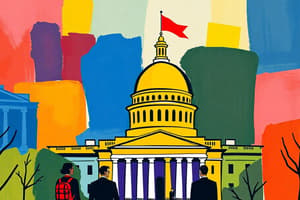Podcast
Questions and Answers
What is meant by 'Political Socialization'?
What is meant by 'Political Socialization'?
- The practice of outsourcing government functions.
- The emotional connection a citizen has with the government.
- The methods used to measure public opinion.
- The process by which individuals learn political beliefs and values. (correct)
Which principle states that all individuals and institutions are accountable to the law?
Which principle states that all individuals and institutions are accountable to the law?
- Political Ideology
- Rule of Law (correct)
- Generational Effect
- Individualism
What is a Representative Sample in polling?
What is a Representative Sample in polling?
- A survey that includes only participants from a single political party.
- A random selection of individuals from a specific demographic.
- A sample that reflects the broader population accurately. (correct)
- A small survey conducted at political events.
What does the term 'Weighting' refer to in polling?
What does the term 'Weighting' refer to in polling?
Which polling method ensures that each individual has an equal chance of being selected?
Which polling method ensures that each individual has an equal chance of being selected?
What is a Tracking Poll used for?
What is a Tracking Poll used for?
The term 'Generational Effect' refers to what?
The term 'Generational Effect' refers to what?
Which concept involves the way survey questions are phrased?
Which concept involves the way survey questions are phrased?
What does the term 'Party Platform' refer to?
What does the term 'Party Platform' refer to?
Which political ideology advocates for minimal government interference in personal and economic affairs?
Which political ideology advocates for minimal government interference in personal and economic affairs?
What does the Equal Protection Clause entail?
What does the Equal Protection Clause entail?
What is the primary focus of the 'Affordable Care Act'?
What is the primary focus of the 'Affordable Care Act'?
What is the function of the Federal Reserve System?
What is the function of the Federal Reserve System?
What does the term 'de facto discrimination' refer to?
What does the term 'de facto discrimination' refer to?
Which of the following amendments prohibits voting restrictions based on race?
Which of the following amendments prohibits voting restrictions based on race?
Which economic system is characterized by the government making all economic decisions?
Which economic system is characterized by the government making all economic decisions?
What was the outcome of the Schenck v. U.S. case?
What was the outcome of the Schenck v. U.S. case?
What does 'selective incorporation' refer to?
What does 'selective incorporation' refer to?
What does the term 'Affirmative Action' refer to?
What does the term 'Affirmative Action' refer to?
What is 'straight-ticket voting'?
What is 'straight-ticket voting'?
Which of the following best describes 'civil liberties'?
Which of the following best describes 'civil liberties'?
What does 'Prior Restraint' refer to?
What does 'Prior Restraint' refer to?
Flashcards
Political Culture
Political Culture
The collection of attitudes, beliefs, and feelings held by citizens about politics and government.
Political Socialization
Political Socialization
The process by which people learn political beliefs and values.
Scientific Poll
Scientific Poll
A poll using scientific method to represent population views.
Representative Sample
Representative Sample
Signup and view all the flashcards
Sampling Error
Sampling Error
Signup and view all the flashcards
Focus Group
Focus Group
Signup and view all the flashcards
Random Selection
Random Selection
Signup and view all the flashcards
Public Opinion
Public Opinion
Signup and view all the flashcards
Political Ideology
Political Ideology
Signup and view all the flashcards
Right vs. Privilege
Right vs. Privilege
Signup and view all the flashcards
Party Identification
Party Identification
Signup and view all the flashcards
Conservatism
Conservatism
Signup and view all the flashcards
Liberalism
Liberalism
Signup and view all the flashcards
Libertarianism
Libertarianism
Signup and view all the flashcards
Mixed Economy
Mixed Economy
Signup and view all the flashcards
Civil Liberties
Civil Liberties
Signup and view all the flashcards
Civil Rights
Civil Rights
Signup and view all the flashcards
Bill of Rights
Bill of Rights
Signup and view all the flashcards
Due Process
Due Process
Signup and view all the flashcards
Establishment Clause
Establishment Clause
Signup and view all the flashcards
13th Amendment
13th Amendment
Signup and view all the flashcards
14th Amendment
14th Amendment
Signup and view all the flashcards
Civil Rights Act of 1964
Civil Rights Act of 1964
Signup and view all the flashcards
Study Notes
Political Culture and Ideology
- Political Culture: A set of attitudes, beliefs, and feelings toward politics and government.
- Individualism: Emphasis on individual rights and importance.
- Free Enterprise: Economic system with private ownership and profit motive.
- Rule of Law: Concept that everyone, including institutions, is accountable to laws.
- Political Socialization: Process of learning political beliefs and values.
- Political Ideology: A set of beliefs about government goals and methods.
- Generational Effect: Influence of significant events on a generation's views.
- Life Cycle Effect: Political view changes as people age.
- Globalization: Increasing global interconnectedness of economics and cultures.
- Outsourcing: Employing external firms for tasks previously handled internally.
Public Opinion & Polling
- Focus Group: Small, diverse group to gauge reactions to issues, candidates, or ideas.
- Scientific Poll: Poll using scientific methods for a representative sample.
- Sample: Subset of the population selected for polling.
- Random Selection: Equal chance for each person to be selected.
- Representative Sample: A sample reflecting the population's characteristics.
- Weighting: Adjusting poll results to account for demographic factors (age, sex, race).
- Sampling Error: Difference between sample's results and the population's true opinions.
- Mass Survey: Large survey to capture broad population opinions.
- Entrance Survey: Poll taken as people enter an event.
- Exit Poll: Poll taken as people leave an event, often voting locations.
- Benchmark Poll: Initial poll providing baseline data for candidates or issues..
- Tracking Poll: Regularly conducted poll to follow public opinion shifts.
- Random Digit Dialing (RDD): Randomly generated phone numbers for a varied sample.
- Question Order: Sequence of poll questions influencing responses.
- Question Wording: Phrasing of questions, which can lead to biased answers.
Economic Policy & Ideology
- Political Ideology: Set of beliefs about what government should do and how it should function.
- Right vs. Privilege: The distinction between inherent rights and government-granted privileges.
- Party Identification: Alignment with a political party.
- Party Ideology: Core beliefs and principles of a political party.
- Conservatism: Political ideology favoring limited government involvement and traditional values.
- Liberalism: Political ideology supporting government action for addressing social problems and inequalities.
- Libertarianism: Political ideology emphasizing minimal government intervention.
- Laissez-Faire Economy: Minimal government regulation in business.
- Command-and-Control Economy: Government makes all economic decisions.
- Mixed Economy: Combination of private and public enterprise.
- GDP (Gross Domestic Product): Total value of goods and services in a country.
- Economic Recession: Period of economic decline.
- Unemployment Rate: Percentage of actively seeking employment but unable to find work.
- Inflation: General increase in prices for goods and services.
- Fiscal Policy: Government policies on taxation and spending.
- Federal Reserve System: The central banking system of the U.S.
- Monetary Policy: Federal Reserve's regulation of money supply and interest rates.
- Medicare: Federal health insurance for seniors.
- Medicaid: Federal healthcare for low-income individuals.
- Affordable Care Act (ACA): Healthcare reform law increasing affordable insurance options.
Political Parties
- Party Identification: Individual's affiliation with a political party.
- Party Platform: A set of principles, goals, and policies a party supports.
- Straight-Ticket Voting: Voting for candidates from the same party.
- Split-Ticket Voting: Voting for candidates from different parties.
- Realignment: Shift in political party dominance, often after a critical election.
- Critical Election: Election leading to a significant change in party control.
- Divided Government: When presidency and Congress are controlled by different parties.
- Third Parties: Political parties outside of the two major parties, often focusing on specific issues.
Civil Liberties & Rights
- Civil Liberties: Freedoms guaranteed by the Bill of Rights.
- Civil Rights: Rights to equal treatment under the law.
- Bill of Rights: First ten amendments protecting civil liberties.
- Due Process: Legal requirement that government respects legal rights.
- Incorporation Doctrine: Applying Bill of Rights to the states.
- Selective Incorporation: Gradual application of Bill of Rights to states.
- Establishment Clause: First Amendment prohibiting establishment of an official religion.
- Free Exercise Clause: First Amendment protecting religious freedom.
- Lemon Test: Three-part test for government action violating Establishment Clause.
- Clear and Present Danger: Standard to limit speech due to potential harm.
- Prior Restraint: Government censorship before speech occurs.
- Symbolic Speech: Nonverbal communication conveying a message.
- Hate Speech: Speech inciting violence or discrimination.
- Slander: False spoken statements harming reputation.
- Libel: False written statements harming reputation.
- Fighting Words: Speech likely to provoke immediate violence.
- Writ of Habeas Corpus: Court order bringing prisoners before a judge.
- Ex Post Facto Law: Punishing actions retroactively.
- Bill of Attainder: Punishing individuals without trial.
- Exclusionary Rule: Illegally obtained evidence is inadmissible in court.
Civil Rights
- 13th Amendment: Abolished slavery.
- 14th Amendment: Granted equal protection, due process to all citizens.
- 15th Amendment: Prohibited voting restrictions based on race.
- 19th Amendment: Granted women the right to vote.
- Equal Protection Clause: Part of 14th Amendment requiring equal treatment.
- Civil Rights Cases (1883): Supreme Court ruling allowing discrimination by private businesses.
- NAACP: National Association for the Advancement of Colored People.
- Civil Rights Act of 1964: Prohibition of discrimination based on race, color, religion, sex, or national origin.
- De Jure Discrimination: Discrimination sanctioned by law.
- De Facto Discrimination: Discrimination resulting from social factors, not law.
- NOW: National Organization for Women.
- Equal Rights Amendment: Proposed amendment ensuring equal rights for women.
- Strict Scrutiny: Highest level of scrutiny for laws affecting fundamental rights.
- Equal Pay Act of 1963: Prohibits gender-based pay discrimination.
- Title IX: Prohibits sex-based discrimination in education.
- Affirmative Action: Policies aiming to increase opportunities for historically disadvantaged groups.
Court Cases (Chapter 8 & 9)
- Details of specific cases (Gitlow v. New York, Near v. Minnesota, Lemon v. Kurtzman, Engel v. Vitale, Schenck v. U.S., Brandenburg v. Ohio, NYT v. U.S., Texas v. Johnson, Tinker v. Des Moines, Hazelwood School District v. Kuhlmeier, Reynolds v. U.S., Wisconsin v. Yoder) are not included due to the format requirement of bullet points.
Studying That Suits You
Use AI to generate personalized quizzes and flashcards to suit your learning preferences.




